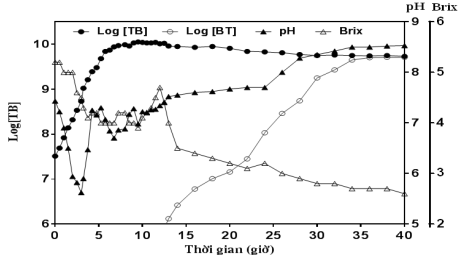Abstract
Background: Bacillus subtilis KP3 which produces antioxidants and has good probiotic characteristics, was isolated by Laboratory of Pharmaceutical Biotechnology, but fermentation conditions of this strain have not been studied for producing large number of B. subtilis KP3 spores.
Objectives: Fermentation conditions of B. subtilis KP3 on flask and fermenter were investigated.
Methods: The fermentation medium on flask were optimized using response surface methodology for B. subtilis KP3 biomass production. Then, the minerals were supplemented to optimal culture medium at different time to induce sporuation of B. subtilis KP3. Moreover, stirring speed, pO2, inoculation rate and data for fed-batch fermentation were surveyed in fermenter in order to increase the density of spores.
Results: The appropriate medium for producing *B. subtilis *KP3 biomass consisted of glucose 10 g/l, non-oil soybean 19,75 g/l, amonium citrate 1,7g/l, molasses 7,2 g/l, pepton from meat 11,13 g/l, MnCl2 16,58 mM (1ml/l), K2HPO4 4,58 g/l, CaCl2 0,01 g/l, NaCl 4,04 g/l, FeSO4.7H2O 1 μM (1ml/l), MgSO4.7H2O 0,38 g/l, after 8 hours of fermentation, CaCl2 0,5 g/l and FeSO4.7H2O 35 μM (1 ml/l) were supplemented to the medium to stimulate spore production, and spore yields increased by 3 times compared with control medium. In batch experiment, suitable culturing conditions were 50% of pO2, 400 rpm of stirring speed and 5% of inoculation rate. In fed-batch experiment, molasses was added to the speed 58 ml/hour, for 8 hours. Spores were harvested after 32 hours of incubation, reaching densities 4,46.109 spores/ml, up 2.3 times compared to fermentation flask.
Conclusions: The fermentation conditions of Bacillus subtilis KP3 spores
